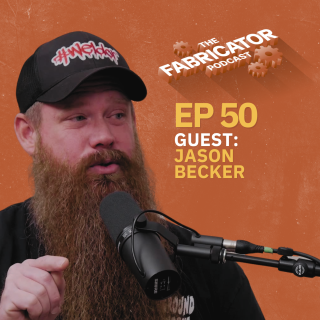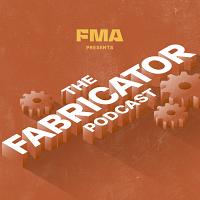Welding, teaching, podcasting, and business ownership with Jason Becker
This week on The Fabricator Podcast, Jason Becker, host of the Arc Junkies Podcast and owner of Underground Metal Works, shares his journey into welding and how the trade has opened doors he never would have expected, leading him to become an ironworker, educator, podcaster, and business owner.
Becker talks about how he earned his first welding certificates before he even learned how to drive, and how he carried over that trade when he joined the Marine Corps. After leaving the military, he worked as a structural steel ironworker before transitioning into teaching welding at Florida colleges and working for weld.com.
Becker talks about how those opportunities eventually led him to taking over the Arc Junkies Podcast, buying Underground Metal Works, and partnering with American Welding Society (AWS). He discusses the challenges and rewards of teaching welding, the importance of hands-on instruction, and the diverse career opportunities available in the welding industry. He also shares his passion for the podcasting and the opportunity it provides to learn from and connect with experts across the metal fabrication and welding industry.
At the top, a conversation about Becker working on various Florida theme parks lead to a discussion about how Austin Hargett of weld.com took to TikTok to rate welds at a Six Flags.
This episode was recorded on location at the 2024 FMA Annual Meeting in Clearwater, Fla.
Email us at podcast@fmamfg.org with any comments, questions, or suggestions. Learn more about podcast sponsorship opportunities.
In This Episode
Learn more about FMA's 16th Annual Safety Conference.
Learn more about Golf4MFG South.
Learn more about podcast sponsorship opportunities.
Listen to the Arc Junkies Podcast.
Learn more about Underground Metal Works.TRANSCRIPT
Jason Becker: They sent me out with the other field crew, and so I get out there and I'm like, "Oh, cool, more standards than handrails." No, bar joists and girders and decking and perimeter angle. And I was like, "What's all this stuff?"
Lincoln Brunner: Wow.
Jason Becker: I had no idea. I just followed a guy up a ladder one day and I found myself on a three-inch bar joist. Well, this is kind of cool.
Lincoln Brunner: Not aluminum anymore.
Jason Becker: No. I was like, "Here's that adrenaline I was looking for."
Sara Spring: If you need to stay up to date with the latest developments and workplace safety, then you won't want to miss the 16th Annual Safety Conference held in Elgin, Illinois from April 30th to May 1st. This event brings together industry experts to address emerging challenges and recognize excellence in safety practices. With educational sessions covering cutting edge developments, you'll gain the knowledge and expertise needed to ensure your workplace is safe and secure. Don't wait. Register for the 16th Annual Safety Conference and Awards dinner today at fmamfg.org.
Dan Davis: Hello, Dan Davis with the Fabricator Magazine. On this episode of the Fabricator Podcast, I'm joined by...
Lincoln Brunner: Lincoln Brunner.
Dan Davis: ... Of TPJ, tubing Pipe Journal and a Fabricator.
Lincoln Brunner: Good to be back.
Dan Davis: Yes. We're broadcasting live. Are we really broadcasting? We're not really live.
Gareth Sleger: We're recording.
Dan Davis: We're being surveilled. Here at Wyndham Grand in Clearwater Beach for the FMA annual meeting. Today's episode we have Jason Becker, you might know him from the Arc Junkies Podcast. You might know him from Underground...
Gareth Sleger: Metal Works.
Dan Davis: Metal Works. Thank you Gareth. And he's also involved with working on welding procedures and certifications and...
Lincoln Brunner: He was on weld.com for a while.
Dan Davis: Yeah, he's a consultant. He does a lot of things in the welding industry. Good guy.
Gareth Sleger: Amazing how many times people approached him to get involved with things, and now he's still involved with all those things.
Lincoln Brunner: He's sticky.
Dan Davis: He is a man who knows his calendar. He's a man who knows his calendar very well. So today in the conversation with Jason, he touched upon his time in the Iron Workers Union down here in Florida, and he made a comment that he spent quite a amount of time out at one of the area amusement parks. So that kind of...
Lincoln Brunner: Morphed?
Dan Davis: Yeah, it kind of...
Gareth Sleger: Like the conversation of, there's a video on TikTok of this guy going around to an amusement park at Six Flags. I don't know which one it is, but it's a Six Flags and just judging and rating welds on railings-
Dan Davis: Rides.
Gareth Sleger: Yeah, roller coaster equipment.
Dan Davis: Right. And I think you get involved in this industry, you do tend to look at welds a little bit more critically, I think.
Lincoln Brunner: Oh my goodness. I can't go to a department store. I can't go to a mall without noticing welds on railings now, I was like, "Oh my gosh, what am I doing?" I walk up at the airport and I'm looking at the joints on the railings, and I thought, ££What in the world?£
Dan Davis: Same.
Gareth Sleger: And I've never used a welder, so I'm the last one to be able to judge, but I noticed those now too.
Dan Davis: The one person we were thinking about goes by the handle Dr. Welds, is that correct? And he's a gentleman actually with some experience. So he was not only spotting the welds, but also kind of offering a description/
Lincoln Brunner: Explaining why it was a bad weld?
Dan Davis: As opposed to some of his imitators out there who are just kind of using terms like, "Oh, ugly. Oh, fat."
Lincoln Brunner: Big and fat. Nice.
Gareth Sleger: It's Austin Hargett. He works for weld.com, where Jason worked for like I said.
Dan Davis: Really? Comes full circle, then.
Gareth Sleger: He goes by Dr. Welds on TikTok.
Dan Davis: Yeah, so good follow, actually offers some depth to his observations. I know the one place I noticed him recently was at the health club, which is kind of hard to believe that I'll go to a health club.
Lincoln Brunner: Weren't you actually just working out?
Gareth Sleger: He was just there to look at the welds.
Dan Davis: You're kind of using these weight-bearing machines. You turn your head and you're like, "Oh, that's not very smooth."
Gareth Sleger: At one point Jason was talking about he had to tell some of his students that you can't just rely on tack welds as a structural reinforcement.
Dan Davis: To the point where he was talking about doing the actual joint test where they're cutting it open and I think that's what you're kind of missing with some of these other amusement park observations where some yahoo's trying to judge a weld from a hundred feet away using his iPhone to zoom in on it.
Lincoln Brunner: "This doesn't look very good. I don't like this."
Gareth Sleger: Well, the guy who did this video on TikTok is legit because he works for weld.com.
Dan Davis: No, but I'm talking about other people who probably don't offer up those insights. I am for the most part, don't go on amusement rides, so I'm okay there.
Lincoln Brunner: Oh man, when I get the chance, I like going. There was one at Six Flags in Texas called The Batman, which was a lot of fun.
Dan Davis: Is that the one you hang from?
Lincoln Brunner: You hang from and it's a little scary, but you get done it. And I couldn't unlock my left arm because I was gripping the thing so tight like, oh gosh. Yeah, it was good stuff.
Dan Davis: Unless there's a faulty weld on the sofa, I'm not going to run into too much trouble in my life. So with that note, stay safe out there and enjoy this episode of The Fabricator Podcast.
Sara Spring: Spring is right around the corner, which means it's time to dust off your clubs and get ready for Golfer Manufacturing South. This event is a fantastic opportunity to network with peers and contribute to NBTs manufacturing camp and scholarship programs. Enjoy a day of golf while supporting a great cause this April 15th at TPC Piper Glen in Charlotte, North Carolina, save your spot today at fmamfg.org. And now, back to the episode.
Dan Davis: Thanks for joining us again, Jason Becker from Arc Junkies podcast. Thanks for joining us.
Jason Becker: Thanks for having me.
Dan Davis: Yeah. So yeah, tell us about how you got started in welding.
Jason Becker: Oh man. I started welding in high school back when they actually had trades pathways in high school, so I decided, I think it was my 10th grade year of high school I wanted to get into welding.
Dan Davis: Where did you grow up?
Jason Becker: Well, so I was born in northeastern Ohio, and then we moved down here in '89 down here to Florida in '89 and been here ever since. So I went to West Orange High School during my high school time and went to the vocational program. They had West Side VoTech, which is you could go over there and do skilled trades programs as part of two electives. So instead of picking gym and underwater basket weaving, I was like, "Let me try this welding deal out," because my dad, he'd done some welding and stuff and the summer prior to that, I used to dig swimming pools with him during the summers and I watched him cut a piece of chain one day and I was like, "Man, he's melted steel with fire. That's kind of cool." So I signed up for welding class my 10th grade year and got into it and I thought it was pretty neat. We were doing oxy fuel cutting and oxy fuel brazing, and then all of a sudden he hands me a stick and this electrode holder and he's like, "Check this out," and shows me this process. And I was like, "Man, that's cool." And I thought that was welding and then finished that module and then we got into MIG welding and finished that one. Got into TIG and I was like, "How many different processes are there?" And it just spiraled. It was like a moth to a flame. I was just pulled into it and never left.
Dan Davis: Yeah. Did you figure you would be on the path for as long as you have been?
Jason Becker: No. No. I think I had my first welding cert before I was able to drive, like legally drive, before I had my driver's license, I was a certified welder.
Dan Davis: So you were in?
Jason Becker: Yeah, I mean at that point, and then I graduated and I was going to join the Marine Corps. I had pretty decent grades in school. I could have got a scholarship, but I was like... I don't really feel like I earned tuition just because I was able to regurgitate a bunch of information in the textbook. So I was like, "Let me go out and earn this thing and kind of figure out what I want to do with my life." And my recruiter guaranteed me one of two jobs when I joined the Marines. He said, "You can be a combat engineer or a welder." And luckily enough I was chose to be a welder. So I did that the four years that I was in.
Dan Davis: Where were you based?
Jason Becker: Camp Lejeune.
Dan Davis: Oh wow. So you stayed there?
Jason Becker: Well, pretty much, I mean, I went through basic training, Paris Island, place that God forgot, it's about eight miles south of hell and finished that up, went on recruiting duty, came back, did marine combat training, and then went up to Aberdeen, Maryland to go to welding school all over again.
Dan Davis: No kidding.
Jason Becker: And then I was stationed at Camp Lejeune, and then shortly after that I did two tours, did Kuwait for six months, came back for about a year, and then went to Iraq for eight months.
Dan Davis: Oh wow.
Jason Becker: And then came back home and got out.
Dan Davis: Man, and I mean, that's really important stuff, I mean, that's when all the IED...
Jason Becker: Oh yeah. So everything was kicking off. We're building the anti-decapitation devices for the folks that were going through Baghdad and Fallujah and all that. We'd have to build these... It was kind of like an upright on the front of the Humvees and seven tons for the gunners because they were stringing a piano wire in between the buildings and stuff, so when they roll through town, people were getting decapitated.
Dan Davis: Oh, jeez.
Jason Becker: So we had to set up these, it was essentially angle iron with a plate welded on top and we'd just make a little like a bottle opener type shape into it, and then we'd sharpen that up and then they could roll through kind of unrestricted.
Lincoln Brunner: The innovations you got to make in the heat of things.
Jason Becker: Oh yeah. It's like, "Hey, we got a problem. Let's figure out how to solve it." Right?
Dan Davis: Yeah. What type of... Not so much timetable are we talking about, something occurs out in the field and then you're getting a call like, "Hey, we need to get to work on this?"
Jason Becker: It was like day of or a couple days after. I mean, they're coming back. We had MPs on the base, and they were the ones that came back to us and they were like, "Hey, look, here's the problem. How do we figure this out? Go. And, oh yeah, by the way, you can't be anything permanent because we have to do PMCSs every day before we take out the vehicle." So it has to be easily accessible. They got to be able to put it on pretty quick, take it off pretty quick because they got to go through and there's a whole check sheet you got to go, before you have to go through this thing before you even start the engine on the Humvee or the seven ton. So they have to be able to get to all the engine components, check the oil, all that good stuff. So it's got to be very user-friendly and it's got to be like dummy proof because we're Marines.
Dan Davis: But no, I mean, that's how it is in manufacturing.
Jason Becker: I could say that, keep it simple.
Dan Davis: Dan Davis did not say that about all armed forces.
Lincoln Brunner: Well, it reminds me of the story of World War II where they had to figure out a way to cut through hedgerows in France because they were so thick and this is going to impede the Sherman tanks, and they figured out a way pretty quick, and you just had to come up with a solution right then and there for who knows how many vehicles.
Jason Becker: Yeah, it's all innovation through necessity.
Dan Davis: How many welders they have on duty?
Jason Becker: It was me and four or five other guys in our platoon.
Dan Davis: No kidding.
Jason Becker: That was it. Yeah, we were attached to a machinist, so it was a support company, so we had welders and machinists. So there's probably five or six machinists and five or six welders.
Dan Davis: Yeah, so that's intense, man. Did you know at that time maybe you weren't going to make a career in the Marines? How does that thinking work?
Jason Becker: Fast-forward till 2005, I was in Iraq and I had my enlistment papers in hand and I was planning on reenlisting. So part of my enlistment package was I wanted to go to Jump School and just because when you enlist in the Marine Corps, they're like, "We'll give you whatever you want to keep you in." It's a big carrot they dangle in front of you. So I was like, "I want to go through Jump School and then want to go up to Aberdeen, Maryland to be a welding instructor again." And I was going through some things and got tired of playing in the sandbox, and I was like, "You know what? I think I'm just going to get out. I'm going to get out and I'm going to join law enforcement." And so it was like 2005, I was in Iraq with my papers on my hand, and I had a good buddy that was literally across the street in a different battalion and we were gunning for the same job, but I had already had my packet and everything. The job was pretty much mine. All I had to do was turn this packet in. And so the night before I was supposed to turn it in, I walked across the street and I was like, "Hey Baker. If you want this job, it's yours because I'm not submitting my packet. So first thing in the morning, go see the career planner, you could have it." And then I think that was August, September, and then I flew back home in October and EASed. And got out.
Dan Davis: No kidding. Wow, there you are in a civilian life.
Jason Becker: Yeah.
Dan Davis: How was that?
Jason Becker: It was a rough transition in the beginning. When you're in the military, you've got a sense of purpose. You know what you're going to do every day. I was in charge of other Marines, so I had a good idea of what they needed to do. There was always a mission or a goal and I got out and I didn't have any of that. It was just like, "You're on your own." So I felt like one man on an island. So I was like, "I need to get to work quick because this is not good for my mental state." So I grabbed a newspaper. That's how you found a job back in 2005. There wasn't a whole Google and Monster and you didn't have all that stuff.
Gareth Sleger: You're talking to the demos.
Jason Becker: Right? Yeah. I grabbed a local newspaper and there was a company hiring for somebody that could weld aluminum. So I was like, "I can do that." When I was stationed in Kuwait, that's all... I mean, we welded more aluminum than anything else.
Lincoln Brunner: On what?
Jason Becker: So we built these four foot by four foot by 12 inch tall oil pans essentially because we had LVS', like a semi truck, for lack of a better term, and they had a lot of different oils and fluids and stuff that they had to drain. So we built these massive oil pans for them. We'd weld up travel locks on howitzers. When the howitzers are hooked to a Humvee or seven ton, when they're pulled down the road to keep that barrel from bouncing, they lock it in position with the travel lock. And because it was aluminum, it would always break and crack and stuff like that. So I had a lot of time on your spool gun. So as soon as I seen this ad in the newspaper, I was like, "If I can do that and 20 mile an hour winds in the middle of the desert, I could definitely do that in sunny Orlando, Florida." So I jumped on that.
Lincoln Brunner: And now what company was that?
Jason Becker: It was a company called Pioneer Welding, and unbeknownst to me, I thought I was just going there to weld a pan rail and stuff, and it's a structural steel iron company.
Dan Davis: Oh wow.
Jason Becker: So that's kind of how I got into structural steel iron because it was me and one other guy. We'd go out and install stairs and handrails at this place called Baldwin Park, which is an old decommissioned navy base that they turned into this really highfalutin rich people town or whatever, and kind of like Lake Nona headed that direction, like celebration and all that, not so it's kind of like its own little community surrounded by million dollar homes and everything that they need so they really don't have to leave. And we put up all these stairs and handrails. I did that for about a year, but in between, we were installing them so fast the shop guys couldn't produce them fast enough. So instead of hanging out at the house all day waiting for them to get the rest of it in, they sent me out with the other field crew. So I get out there and I'm like, "O cool, more standards than handrails," no, bar joists and girders and decking and perimeter angle. And I was like, "What's all this stuff?"
Gareth Sleger: Wow.
Jason Becker: I had no idea. I just followed a guy up a ladder one day and I found myself on a three-inch bar joist. I was like, "Well, this is kind of cool."
Lincoln Brunner: Not aluminum anymore.
Jason Becker: No. I was like, "Here's that adrenaline I was looking for."
Dan Davis: No kidding.
Jason Becker: Yeah. So you're like 40, 50 foot up in the air walking like a three-inch wide bar joist. It's a lot of fun.
Dan Davis: So you found something you really liked at that point?
Jason Becker: Yeah.
Dan Davis: Yeah. A lot of people would just get freaked out by that moment and go the other direction and-
Gareth Sleger: "I'm not going up there."
Jason Becker: I liked heights, man. I did a lot of climbing as a kid, not on a mountain or anything, but anytime I saw a tree, man, let me see how high I can get up in this thing. So structural steel iron work, I was like, "Cool, now I'm just climbing metal."
Dan Davis: Were you using a flex score or was it stick?
Jason Becker: No, it was mostly stick, all 70:18 for the perimeter angle and stuff like that. And then 60:22 for all of our decking. And then we would hot rod the decking out around different shapes for air conditioner units or other holes that needed to be in the roof.
Lincoln Brunner: It sounds like hot work.
Jason Becker: Oh, it is. It is, especially in Florida and everything's reflective, so you are laying galvanized B decking down and it just reflects everything back onto you. I love the structural part, decking sucks.
Dan Davis: How long did you stick with that?
Jason Becker: I did structural iron work for about 10 years.
Dan Davis: Oh wow.
Jason Becker: I did it for probably about four or five years before I joined the Iron Workers Union and I joined the Iron Workers Union in 2010. And it was more or less they sent me out to one of the theme parks. And it was funny because I tell everybody I did structural steel iron work before I joined the Iron Workers Union, and then once I got in the Iron Workers Union, it was all ornamental and architectural because I had a background in fabrication and I could stick MIG, TIG, flux score. Most iron workers when they go through the apprenticeship program, they learned stick and they learn flux score. Not too many of them know how to TIG on stainless and aluminum or do detail work polishing and stuff like that. So that once they found that I had that particular set of skills, they're like, "Oh yeah, we're going to put you over at the theme park." And I pretty much stayed there my entire apprenticeship and then all the way up to my becoming a journeyman. And we did some structural, so we made repairs on the Earffel Tower, which is now gone, but we had to go up there and replace all the perimeter decking that was up there. So it was like 165 feet up in the air. You cut out this old tread plate and you put in new and scabbing in different pieces of I-beams just to maintain the structure and keep it safe for the maintenance guys who had to go up there. We did... What was it? Catastrophe Canyon. Every year they would do a shutdown just because it's a water attraction. So the water gets in there and it's all heavy, heavy chlorinated water to keep any bacteria levels down and it just corrodes any steel it touches. We'd go through and cut out I-beams and angle iron and channel and just re-weld new pieces in all the time.
Lincoln Brunner: Acid is very unforgiving on iron.
Jason Becker: Yeah.
Lincoln Brunner: So you had mentioned teaching before up in Maryland, and is that where you got the teaching bug, was in the Marine Corps?
Jason Becker: Kind of. Yeah, because even especially in the Marine Corps, once you go through, as soon as you pick up rank a little bit, you become a lance corporal, you start training the privates and PFCs. When you become a corporal, you train the lance corporals, private, PFCs and it's a trickle-down effect. Every time you pick up a rank, you get assigned to a new group of people that you have to train, whether it's safety or field maneuvers or whatever the case may be. So I kind of had somewhat of an inclination of how to teach people and keep things correlated to what they're trying to learn and kind of break it down and use metaphors and euphemisms and stuff like that. I had to clean a lot of that up when I got into education. Some of the metaphors and use the euphemisms you would use in the military, you can get away-
Lincoln Brunner: Marine Corps is a little-
Dan Davis: Public sector?
Jason Becker: My mom never got over the US Army, what they did to my father.
Dan Davis: In the teaching aspect, how do you jump into the teaching role from your career as an ironworker?
Jason Becker: That was a little bit difficult because the military is very similar to structural steel ironwork, so you can talk to people a different way than you can...
Lincoln Brunner: At a more street level?
Jason Becker: Yeah. A little group of kids that just graduated high school and decided that they wanted to get into welding. So it was a little bit different in the beginning, but most of my students, I mean the first class that I had, I had nine students and they ranged from age 18 to 56. It was a big gap between these nine different people and how do you identify and teach nine different learning styles? And so it was kind of again, trial by fire.
Dan Davis: So what made you want to get into teaching?
Jason Becker: I had one of my professors, I was working on my associate's degree and I just finished that up and I think I graduated that Thursday and then Monday morning I was in my bachelor's degree classes. So I wanted to try to get as much as I could as fast as I could. And so I was in this class, it was construction something or other, and Professor Jesse Cam was like, "Hey," we went through the whole process, "Stand up, introduce yourself," this, that, and everything. So I stood up, "My name's Jason Becker, I'm a structural steel iron worker and a welder," and he's like, "I need to see you after class." I was like, "Oh damn, I already got in trouble." I was like five minutes into day one I'm in trouble.
Lincoln Brunner: What did I do?
Jason Becker: Because I'm an ironworker, right? I'm automatically bad news.
Dan Davis: I've got to watch this dude as he's speaking with my students.
Jason Becker: So he pulled me aside after class. He's like, "Hey, we're getting ready to start up a welding program. I think you would be a good fit as the instructor." I had previous classes with Professor Cam during my associates and he says, "Yeah, we're starting this new program up." He said, "I think you'd be a great person to teach it." And I was like, "No, you got the wrong guy, I'm with the union, I got a pension, I got an annuity, I got good benefits, I get a good hourly wage, I get time and a half after eight hours, weekends are time and a half, I'm set man." And he stayed on me the whole term of that class. And then I think I graduated that class and he called me up a couple months later. He is like, "Hey, this class is getting ready to pop off. We just put a whole fume extract, just come down and look at it." I went over and I met him and I was like, "Yeah, let me give this a shot. I'll teach for a term and if I don't like it, I'm right back on my tools." And the first term that I was there, man, I fell in love with it and it was a year long program and I was like, "I can't leave these students after 16 weeks, so let me stick it out for a year." And then a year turned into two and then that turned into another college seeking me out and recruiting me to go work for them. And I fell in love with teaching.
Lincoln Brunner: Well obviously they thought it agreed with you too or they wouldn't have asked you to stay on, but what was it about the whole student experience as an instructor, you've just really turned your crank, what is that?
Jason Becker: So it's like my buddy Brian Eubank says, it's that eureka moment. So when you're teaching somebody something and it finally clicks and you see that little light in their eyes that they get it, that's what made everything worth it. That and passing off a skillset that I'm truly passionate about welding, I love everything about it. The more I get into it, the more I love that the skill craft because not everybody can do it. And so to be able to take somebody that's never even used hand tools before, they've never held anything in their hands other than a video game controller or a fork, and you teach them a skilled trade in six months to a year, it's pretty powerful to see that effect that you have on other people's lives.
Lincoln Brunner: Absolutely.
Jason Becker: And then when they call you back after they graduate and they get a good job and they're like, "Hey, I'm working for this company. I'm a foreman now and I'm teaching all the people everything that you taught me," it's really cool.
Dan Davis: Yeah.
Lincoln Brunner: Cool.
Dan Davis: Do you feel like welding has given you this ability to try so many different things? And I think that's kind of one thing that is difficult for people that enter metal fabricating is that they expect... Not everybody, but there's always those pieces on the internet saying, "Be a pipe welder, earn 150,000 in your first year." And people are kind of expecting that. And meanwhile when they get started, they're probably just doing kind of production simple welds over and over again can be a bit repetitive, one of the things that I try to tell them is it's just the beginning, there's a way and if you have the will, you can find yourself doing all kinds of things.
Jason Becker: Yeah. You're literally just scratching the surface once you learn how to weld and then you can start fabricating. And that's the cool thing about welding that I tell everybody and I say it like ad nauseum on the podcast is it can take you to so many different places. If you don't like stick welding, cool. Learn how to TIG weld and go work in a production shop with air conditioning and all that. If you can't see yourself in a little six by six welding cubicle, cool, go over here and get into structural steel iron work. Oh, you don't like that? Go work on the pipeline. I think the salary, the starting salary, that's the carrot they dangle in front of everybody's head. And that's kind of the myth that I would bust day one. I would always ask my students, "Stand up, tell me who you are, tell me why you're here." And I got to the point where I was teaching up to 24 students at a time and I'd go through the classroom and none of them said money. And I was like, "Okay." And I pointed that out. I said, "Notice that nobody in this room said money because the money's going to come eventually. You're not going to graduate here and walk right into a six figure salary." That's the exception of the rule. Can it happen? Yes. Is it going to happen? Probably not. Especially since most people don't want to travel to where the work is. A lot of people, they're like, "Oh yeah, you can get into welding, you can make six figures a year." Well, they don't tell you you got to pack up all your stuff and move to Texas or Louisiana or...
Lincoln Brunner: Three months at a time.
Jason Becker: Exactly. They don't tell you that part. But I said, "You're not going to find a job and then 20 minutes from your house where you're going to make six figures a year straight out of welding school, it's just not going to happen." I mean, unless you live right next door to SpaceX or something like that and you're coming out of my class with 20 years of pipe welding experience, which also isn't going to happen. So let's be realistic, set some goals and work towards those goals. Learn the basics, learn the fundamentals, and you're probably going to bounce around a little bit. Most welders, they work at a company for three to five years and then they find a new opportunity and they just keep moving down their career path that way.
Dan Davis: It's interesting that they have that point of view as a young person where it makes me wonder if sometimes the people that are trying to raise the awareness of welding as a career path don't see the right thing to focus on.
Lincoln Brunner: It sounds like they're dangling the wrong carrot sometimes.
Jason Becker: Well, exactly. But I mean, you've got a lot of these for-profit schools that are out there that put this information up on billboards everywhere. Their marketing is on point. So even as a welding instructor, I'm scrolling through my Facebook feed and Instagram and I'm seeing all these different, because my interest is in welding, they're like, "Oh, if you're interested in welding, you should come to our welding school." So you start scrolling through this stuff and I'm like, "Man, this is a joke." It turns into a puppy mill for welders. And so they're cranking these people out and-
Dan Davis: That's funny.
Jason Becker: It is kind of like college too, because they're luring you in with this big attractive salary, but by the time you leave, they're beating you over the head with this massive debt. You can go to a trade school for free at most of your local colleges. You don't have to go to a welding school where you have to pay $70,000 in tuition and go for 18 months and you're just like another cog in the wheel there and they're just cranking you out. I know a lot of companies in Central Florida that if you have specific school names on your resume, they just throw it right in the trash can.
Lincoln Brunner: Really?
Jason Becker: The for-profit schools? Yeah.
Lincoln Brunner: They've gotten such a bad name, huh?
Jason Becker: They just have such a bad rap. They're just bringing people in, running them through the motion. They're really not getting the skillset they need to walk out the door.
Lincoln Brunner: Right. Well, they're not getting the real world experience a lot of times either while they're in the 18-month program.
Jason Becker: No, and they're not getting the attention they need because they're bringing 40-50 students in at a time and they've got two instructors. How much one-on-one time are you getting with that individual? Not much.
Lincoln Brunner: In contrast, Jason, what are some of the things that you're telling your students at Underground Metal Works that maybe to bust a couple of those myths when they're coming?
Jason Becker: I tell them right up front, "My school's completely different." It's mostly for home hobbyists, DIYers and makers, but we will take some people in that they've already have welding exposure and they just want to learn some advanced skill sets and stuff like that. I'll take those in. So my school kind of fills that gap between what most trade schools and vocational colleges don't teach because they won't bring people in short time. If you want to learn how to TIG weld, that's great. Come on in. We teach that the last six weeks of our 10-month program. I can teach somebody to TIG weld in just a couple of days, fundamentals and basics obviously. And then I tell them to go home and work on this. And once you get to that level, you can come back and take a weekend class and you just keep bumping your skill set up. But it's mostly for people that have always had an interest in welding, but it's never been accessible to them. I mean, sure you can get online, you can get a machine from Harbor Freight, you can watch all the YouTube videos you want, but if you're not getting that immediate feedback, you're spinning your wheels a lot of times because they're like, "I'm doing everything that the guy's telling me." But if you have an instructor there and say, "No, bud, your work angle's off about 10 degrees, just shift that torch, drop it down this way." "Oh," or, "Your filler metal to your tungsten, that angle right there, it's greater than 90 degrees. So that's why your filler metal sticking to your plate." They can't see that when they're under the hood because they're focused on that little molten ball of metal. But from an instructor standpoint, I can walk up within 10 seconds, make a correction that, "Okay, now they're onto the next step." They're not fighting that well every single time.
Lincoln Brunner: Well, and if you're working in a vacuum by yourself, you're going to repeat the same mistakes, you don't have someone telling you what is a mistake. So tell us a little bit about how you got into that particular mode of teaching the school and everything. I'm interested to hear that backstory.
Jason Becker: So I was teaching college back in 2022. Yeah, sounds about right. And they brought me back as a program manager. I left in 2019, went to go work for weld.com for a year, and then I got hired back to my college as a program manager because the drive from where I live to go producing videos at weld.com, it was like two and a half hour one-way commute.
Dan Davis: Oh wow.
Jason Becker: And I did that five days a week, sometimes six days a week for a little over a year, and I just got burnt out with all the drive time. I was putting just as much time in driving sometimes as I was hours at the facility and I really missed teaching in person. So I went back and I became the program manager and they told me it was going to be like an 80/20 split. 80% of the time I'll be in the office doing manager type stuff, the other 20% I'll be in the classroom with the students, which is like, that's where my passion was. So I was like, "Cool, I get the best of both worlds." That wasn't the case. I came back, I taught for a little bit, and then they just kept me in the office and it was business meetings and teams meetings and budget meetings. And I was like, "I'm done with this." And I took over the podcast in 2020. So two years into that I was like, you know what-
Dan Davis: And that's the Arc Junkies podcast.
Jason Becker: So I was like, "You know what? I'm doing well enough with Arc Junkies podcast and I'm doing a lot of traveling and stuff. I'm going to leave the school." But I left the school in August of 2022 and I said, "I'm just going to go out and kind of do my own thing." So for about six months I did the podcast. That's all I was doing. I was loving it and I was developing welding procedures on the side and testing welders. And then my buddy was like, "Hey man, we'd always talked about opening up a welding school. What do you think about making it a reality?" And I was like, "Yeah, kind of." I really wasn't a hundred percent on board with it. And I was like, "Yeah, let's look into it." And so we started looking at some pricing and stuff like that as far as getting machines and equipment and tables and a facility and all that stuff. And we had just found a facility and Stephanie Hoffman that owned Underground Metal Works originally up in New Jersey, Stephanie and I have been friends for good... I mean, since 2016. We met at an instructors institute down at AWS. She calls me up and she's like, "Hey, I know you're thinking about starting up a welding school. Why don't you come up here and check out mine?" That was the year before I went up for her grand opening. February last year, she called me up and she's like, "Hey, I've got an autoimmune disorder and I can't continue to teach." She was on the road for 43 weeks out of the year with AWS doing the careers of weld training. She was doing a bunch of other stuff for AWS doing Metal America plus running the school. So it was just a lot of accumulated stress. So she's like, "I start teaching on a Monday and by Thursday I can't use my hands, and so as much as I hate to give this up, I want to pass it off to you." For a fee, obviously, it's a business. And she's like, "There's about three people that I'm thinking about selling my school to and you're number one on the list because I know that you'll kind of keep it original and not turn it into a puppy mill for welders." So I said, "Okay." So my business partner, and we went up there, we looked at all the equipment and his mom lives like 20 minutes away from Steph's shop, so it worked out perfect. We got to go visit with her, but we ended up saying, "Yeah, we will buy the school." So we bought that June 2023. During that time, we were already fixing up the inside, painting it, doing the concrete work, making sure all the electricity was good, lighting, getting the walls painted, and so we brought everything back July 5th. It landed here in Orlando and we unpacked it in July 17th was the first day we were holding classes.
Dan Davis: Oh wow.
Jason Becker: So it was a pretty quick transition. We were just waiting. We're like, "Okay, what do we do now until we get the equipment?" That was the thing. It's kind of like an open floor space. We bought her entire business turnkey and she had a 40-foot shipping container right next to her shop. So this was perfect. We went up there, flew up there late June, her class ended at 3:30. So at 3:31 we're pitching stuff into the Conex. Air compressors, all the Viper chairs, the Sigmund tables, the CNC plasma cutter, fume extraction system, everything that was in her shop we fit into a 40-foot shipping container. We met the crane operator that following Monday morning. He pulls in, we load the shipping container on the back of a flatbed and that guy leaves. As he's heading out the gate, my buddy and I were getting ready to jump on an airplane. We came back, we were home for a day for the July 4th, and then July 5th we were unloading everything.
Dan Davis: Wow.
Lincoln Brunner: We're wasting no time. Business in a box.
Jason Becker: We were running out of time because we were like... We'd already scheduled like, "Oh yeah, we'll have this done. July 17th will be a good day to start classes." So we'd already sold seats for a class that we didn't have equipment tables for.
Lincoln Brunner: So you had a box.
Jason Becker: The night before, I'm still laying carpet in the showroom. Class starts at eight o'clock. I'm there 11 o'clock at night, and we're putting floor tiles down in the storefront.
Lincoln Brunner: Kind of like an episode of HGTV or something like that.
Jason Becker: Yes. Literally, because as soon as you walk into the school, there's a little merch store. So we sell shirts and cups and gloves and all that good stuff. So I'm trying to get that set up. So that's what I want the people to see first when they walk in, because we're in a heavy industrial area, the property that we're on, there's like seven other businesses. So to look at the school from the outside, you're like, "Man, this place, it is not what I was expecting." But once you walk through that door, it's like, "Okay, now I get it."
Lincoln Brunner: You know what I'm seeing? Bare concrete.
Jason Becker: Yeah. So everything's all kind of done up really nice and we got a lot of good feedback from everybody, as soon as we walk in here, it's like, "Oh, okay, now I get it."
Lincoln Brunner: Nice.
Dan Davis: You kept that same aesthetic that she had in New Jersey right?
Jason Becker: We took her artist, Yucky Bucky on Instagram. He's an awesome dude, super cool. But he was the one that originally did all of her artwork up in New Jersey. So we reached out to him conveniently enough, he's got family in Winter Park, which is like 12 minutes from the school. So he drove down, hung out with family for a week, and every day he came in and he put a new mural up on the wall.
Dan Davis: Wow.
Jason Becker: So we took the Reaper that she had the Stay Rad logo and The Enjoy the Ride logo, and we had him paint all those different pieces on the wall. And then because both my business partner and I are veterans, we had him do a big 14-foot American flag back by the testing area and the guy is super skilled.
Dan Davis: That's great.
Lincoln Brunner: Speaking of being a veteran, did you have any idea that this might be where you were headed when you were doing this in the Marine Corps?
Jason Becker: No, I had no idea what I was going to do. And like I said, I was going to get out and I already served my country now I was going to go serve my local municipality. I wanted to go to Orlando Police Department. I was like, "I'll get into law enforcement with my military background. I'll be a shoe in." And then I found out that they pay you $28,000 a year to get shot at. And I was like, "No." I was like, "So maybe I'll get into Florida Fish and Game. I'll be a wildlife officer." And the pay wasn't much better and I was like, "Man, I've got to start making money. I want to get a house. I've got bills accumulating, I need to go where the money's at." And I was like, "Welding seems to pay pretty good. Let me get into that."
Lincoln Brunner: Yeah.
Jason Becker: That's what happened.
Dan Davis: So you're a man of many talents. You'd mentioned the podcast. Tell us a little bit about the podcast and how you came to be a part of it.
Jason Becker: So when I was with weld.com, I went to South Coast Welding Academy. We did a big event out there and Jimmy McKnight was hosting the podcast originally. So he and I got to link-up and I had listened to the podcast prior to that, so it was the first time I got to meet him in person and we hung out while we were in Texas. He was getting ready to go for CWI, so I was kind of giving him some little hints and study tips and stuff like that, and we just stayed in communication after that event and he called me up, it was like right after I left weld.com, he called me up and he is like, "Hey, I'm getting ready to get out of welding and as part of that I'm going to give up the podcast." And I was like, "Oh man, that sucks. I really enjoy listening to the show." He's like, "Yeah, I'm going to try and find another host, so that's why I'm calling you." And I said, "Okay, I'll call around, see if I can find somebody that's interested." And he's like, "No, I want you to do it." And same thing like Stephanie said, he's like, "There's three people that I can think of that I can pass this off to that aren't going to completely drive this thing into the ground." And I said, "Let me think about it." And so for about two weeks I was like, "I don't want to see this resource go away. I've got a lot of information to share." I was like, "You know what? I'll give it a shot." I called him up and I was like, "Yeah, I'm interested. What do I need?" He sent me a list of... He's like, "Here's some gear. This is good, better and best. Just start off with what you can afford and just work up from there." And so that's what I did. I bought the best that I could get at the time and I've just kind of upgraded it ever since. He and I did an episode, I think it was episode one 20, Passing the Torch. We had to record it twice because the audio got lost somehow. And so he showed me how to edit my first episode and then he was like, "Here you go man. Here's the keys. Here's all the passwords and all the different accounts. Have fun with it." And I was like, "Whoa. I thought I was going to co-host a couple episodes, just kind of tease this." And it was like, nope. Episode 119, Jimmy McKnight, episode 120, Jason Becker.
Lincoln Brunner: Driving a seven ton and I've never done this before. What was it about the podcasting world that maybe was a bit intimidating for you at first?
Jason Becker: Everything. I had no idea how to do audio. I had no idea how to edit. I edited a couple videos when I was atweld.com, but they never made the cut. The camera guy would come back and be like, "Nope, we got to fix this." And he's like, "Redo the whole thing." But I'm not an editor by any stretch of the imagination and I had to learn sound. I had to learn different microphones. I had to learn DXLR cables and USBs and all these different adapters and what type of board to use and sound and what's a noise gate? And what do these different effects do? And what's this high pass filter? I still have no idea what I'm doing, but fake it till you make it. Right?
Dan Davis: We're kind of doing the same.
Gareth Sleger: No, actually Brandon crushes it.
Jason Becker: I don't know. That guy looks like he means business over there.
Lincoln Brunner: Brandon is business back there.
Dan Davis: Gareth's back there wanting to introduce sound effects, like boing.
Lincoln Brunner: You need the whole panel like a radio producer.
Jason Becker: Like a morning zoo.
Dan Davis: Womp, womp. So that's what we're dealing with. Luckily, you're independent, you can do what you want.
Lincoln Brunner: They'll treat you well. Don't worry.
Dan Davis: You've shown a knack from being able to do things well, right from the start to jump in and do what's necessary to do things well. Has that applied to the podcasting as well?
Jason Becker: Yeah. Anytime I take over anything, like I told Jimmy, if I'm going to do it, I'm going to do it a hundred percent. I don't want to go in there and give 50%. I'm going to go full force at it.
Lincoln Brunner: Sounds like a Marine.
Jason Becker: I'll figure it out. And that's exactly what it is. It's that mentality. If I'm going to take over and I'm going to do something, I'm going to do it right or I'm not going to do it at all. That was something that my grandfather taught me when I was out. When I mowed the yard for the first time, and he's like, "Once the job has begun, never stop until it's done. Whether the task be large or small, do it right or not at all." And that's something that's just stayed in my head the whole time. So if I'm not going to give it my all, I'm just not going to do it. I'm not going to tell you I'll be there and not show up. It's just not in me.
Dan Davis: What has been your favorite part?
Jason Becker: All the different guests and learning new things. I don't know everything about welding. The cool thing about welding is you'll never know it all. So every episode I get to learn right along with the guests. I get to ask genuine questions because I'm interested. I tried in the beginning to script. I was like, "Okay, I'll do some research on this person and I'm going to ask them these 10 questions," and the conversation just didn't flow. I think I was on question number three. I think I was talking to the guys with Outlaw Leather and I just grabbed the paper and threw it on the floor, and I just started having a conversation and I was like, "Okay, now I get it."
Gareth Sleger: No, that's the one thing we try to get people to understand is people want to give us a list of questions they want us to ask or they want us to give them questions, Dan or whoever's co-hosting is going to take that conversation in a completely different direction than what's on paper.
Jason Becker: Oh yeah. I usually ask my guests, I always want to ask, is there anything you don't want to talk about?
Lincoln Brunner: Right.
Dan Davis: The murder.
Jason Becker: There might be something... Yeah, the murder, there might be something that the guest isn't comfortable talking about because I can get really techie and dorky when it comes to welding.
Dan Davis: Right.
Jason Becker: But if that's not their strong suit, they're like, "Hey, don't get too technical. I might not be able to follow along." Okay, cool. Most of them are like, they're pretty open books, so everybody wants to talk about everything, and I'm like, "Is there anything that you kind of want me to bring up while we're chatting?" Just because they're the guests, we will highlight something, kind of give you exposure, but that's really other than that, we go off on tangents all the time.
Dan Davis: I apologize when you said I can get very techie and dorky and I go, "Right," that was not an insult at you.
Jason Becker: Oh, no.
Dan Davis: But the reason I brought up is you do get kind of in depth in some of these conversations, and that's not every episode, but I've listened to a couple where, I mean it's hardcore welding talk.
Jason Becker: Yeah. Depending on who I'm talking to, you got to know your audience and know your guest. We can get real into welding nerd stuff and take that deep dive. If I have Nate Bowman on or Charlie Cross or Padraic Bean or Dr. Scott Helzer or Steve Snyder, I know who I can geek out with when it comes to codes or settings or processes and it's just kind of know your guest.
Dan Davis: How many episodes are you up to?
Jason Becker: I think I just released episode 314.
Dan Davis: Oh, wow.
Jason Becker: That's not counting all the episodes that I do with AWS because I do about 12 of them for a year. I think we're on our third year right now, so 26 episodes in with them, and then I kicked off 2020, I think it's 2021, pretty hard. So I was like, "I'm going to do two episodes a week."
Dan Davis: Oh, wow.
Jason Becker: I bit off way more than I could chew, so I released this tech tip type thing, I called it just the Tip Tuesday where I'd talk about just weld tips and they're supposed to be a little short 15 to 20 minute episodes, but I kind of got long-winded, so they turned into 45 minute, and these are solo episodes on, "Let's talk about arc blow," or, "Let's talk about how important your ground clamp is," or, "Let's talk about weld safety," and it just got to be way too much. So I made it for six months. I put in 30 episodes of those. So those aren't numbered episodes, so we're probably somewhere up around 450 episodes, but 314 are numbered.
Dan Davis: Wow. That's cool. Do you find that AWS episodes bring in a different audience?
Jason Becker: They can, especially a lot of new welders because it is geared towards a lot of the resources they have as far as scholarships, events, stuff like that. But then, yeah, there's some really intelligent people that are AWS members that reach out to me and they want to chat.
Dan Davis: Oh, wow.
Jason Becker: Bill Kamos, had I not been doing Weld Wednesday episodes, I don't think I'd ever chatted with him. And it brings in, I got to meet Walts Perko and just so many great people in the industry.
Dan Davis: It was kind of neat to be able to bring AWS to the welding community. I think sometimes welders don't necessarily know what AWS is.
Jason Becker: They just make the connection that they make all the codes and standards and that's the end. No, they've got scholarships and they do classes and there's online curriculum and they do the events.
Dan Davis: That does become kind of that Super Bowl for all these folks in the fabricating community. And AWS is a very valued partner in that mix because in a way, welding's almost like your entry level to the world of fabricating.
Jason Becker: It is, that's the thing. Everybody gets into welding and they're like, "Okay, now I know how to join two pieces of metal together. What am I going to do with it?" Okay, that's the first 10%. Now you need to learn how to cut, fit, fabricate, form, shape and all that good stuff, and then detail it out once you're done. And then we get into coatings, but it just kind of entries. It's the gateway drug to manufacturing.
Dan Davis: I mean, you've probably done fabricating along the way, but did you ever want to get involved in maybe your own business fabricating?
Jason Becker: I thought about it. I ran a small mobile welding business. I don't know if most of you know this, but welding instructors don't get paid a whole lot of money, so especially leaving a skilled trades union and getting into welding education...
Lincoln Brunner: The contrast is-
Dan Davis: When you were making the case about staying instead of taking that education. I'm like, "Yeah, that's pretty difficult."
Jason Becker: I spent a lot of time at Amscot taking out payday loans because I didn't want to leave teaching, and so I was pawning tools and I was like, "Man," well, just because like I said, you start working with these students. First program I taught was a year long. Well, 16 weeks into it, the math isn't adding up, and I don't want to leave these people behind and be like, "Hey, sorry, figure it out. I'm going to go back and make money." So I just figured out a way to make it work. Like I said, I don't jump into things 50%. I was in it to win it. I was like, "I'll at least see this class through." So I was like, "Well, I'm running out of tools to pawn, so what's the next step in this game?" And I had just enough tools left because there were certain things that I'm just not going to sell. I had a mobile generator and I had a Lincoln 210 MP that they just came out with that I bought and a six-inch cutoff wheel. And so I just started going around doing mobile welding work out of the back of my truck. I would teach Monday through Thursday, and I had Friday, Saturday, Sunday off. So it was Friday, Saturday, Sunday. I was going around fixing gates and handrails and stairs and doing stuff for apartment complexes. I was making more money in those three days than I was teaching the entire month at the school because charging out a hundred dollars an hour in eight 10 hours a day for three days. I was making bank, but I didn't have insurance. I didn't have all the benefits. So when another school came along and they were like, "Hey, we want to bring you on," I was like, "Oh, another part-time gig." And they're like, "No, this would be full-time, tenured track." And I was like, "Okay, let's talk." And so they had insurance benefits, they had retirement and all that stuff. So I couldn't take that leap of full-time and self-employment at that time in my life. But it circled back around to where I am in a better spot to do it now.
Dan Davis: Would you ever consider it?
Jason Becker: Consider opening my own-
Dan Davis: Maybe doing a mobile welding small fab shop.
Jason Becker: So I do a little bit of side work now, but between running the podcast, doing the school, and then I've got my own welding certification entity where we do, we develop processes and procedures and test welders. I just don't have enough hours left in the day.
Lincoln Brunner: You like to eat and sleep too?
Jason Becker: Yeah, I mean, that helps, spend time with the family. That's the whole reason I'm doing all this. But yeah, I just don't think there's enough hours left in the day to get into manufacturing. I launched a lot of people in that career or in that path, and I know people in Central Florida that that's what they do and they do it really well. So I train people to go work for them.
Lincoln Brunner: So technical question. Tell us about the beard.
Jason Becker: Beard?
Lincoln Brunner: Yes. How long have you had that?
Jason Becker: Hair grows on my face.
Lincoln Brunner: Yes.
Jason Becker: Pretty technical.
Lincoln Brunner: Exactly. How long have you had it?
Jason Becker: So I started growing my beard back in 2017 before I went to go get my CWI, because I was trying to save some time. I used to shave every night of the military. I had a goatee, but I would shave everything else every night. And I was like, "I could save 7 to 10 minutes a night not having to shave so I could study a little bit longer and sleep in a little bit more, not shave in the morning." So I was like, "I'll shave it once I get my CWI." And so CWI prep course that I went to was two weeks. So I think I'd probably studied for about a month, really heavy before going. And then by the time I got done with the test and everything, I was like, "Okay, now I'll shave it off." And I was like, "You know what? I'm going to wait and get my results. If I pass the test, I'll shave my beard. If not, I'm going to leave it until I can pass that test." And by the time I got my results back, I was like, "You know what? It's literally growing on me. I kind of like it." I went ahead and kept it. And when I got to work with weld.com, that's kind of what I was known by. It was the beard. They call me red beard. And so I was like, "Let me just run with this to see where it goes."
Lincoln Brunner: That's great.
Gareth Sleger: So it was a motivation thing that turned into a brand?
Jason Becker: Yeah, literally it turned into a brand because I remember I did 2020 when COVID came to town. We were all working from home. I was doing the 75 Hard Challenge. So you got a workout twice a day. One of the workouts has to be outdoors for 45 minutes. And so I'd be either riding a bike or running or whatever, and my beard hair is just blowing up because it was about this long. It was blowing up over my face and I was like, "Okay, this isn't working." So I tried tying it up and everything and I was like, "No, this looks ridiculous." And so I was like, "Let me trim it." And all the barbershops were closed and I can weld, but I can't trim my own beard to save my life. And after about the fourth attempt to try and even it out, I was like, "Okay, number one guard, here we go, boom." And I clipped the number one guard on there, just trimmed it all back to about an inch or not a number one guard, like a one-inch guard and after that I started growing it back.
Lincoln Brunner: Nice, nice. It's a good look, man.
Jason Becker: Thanks.
Gareth Sleger: So the weld.com, how did you get involved with weld.com? Had you ever done any sort of... I don't know, multimedia or digital content like that?
Jason Becker: Man, I barely had an Instagram account when I linked up with them. I think I was on Facebook. I think MySpace account was still active.
Lincoln Brunner: Wow.
Dan Davis: Friendster says Hello.
Lincoln Brunner: Hopping in the Wayback Machine. Actually, this guy that works at A WSF from Abrams, he called me up and he's like, "Hey, we're doing this welding educator type forum down here at AWS headquarters in Miami where we're inviting a bunch of welding instructors to kind of come down and tell us how they're teaching welding all across the United States." It was like me and maybe 10, 15 other welding instructors. We went down there and I kind of stood up and explained how I was teaching welding and the owner of weld.com, I guess they recently acquired it right around that time it was 2018. He's like, "Hey, my name's so-and-so I just bought weld.com," and I didn't know what it was. I knew who Bob Moffitt was. I didn't know he worked at weld.com. And I was like, "Cool dude, you bought a domain."
Dan Davis: Good luck with that.
Lincoln Brunner: Pretty good domain.
Dan Davis: It's a good one. It's good domain. That's a good one. We didn't really chat much. He just gave me his card. He called me up almost like a year later and he was like, "Hey, I want to come to your school and shoot a couple of videos." I was like, "What's that mean? Let me get back with you. Let go talk to my director and figure out." So we go back there, we pulled up the videos and I was like, "Oh, that's Bob Moffitt. Okay." I know I always missed the weld.com part of the intro and Wyatt Swain, Mr. TIG and all that. And I was like, "Oh, okay." This is a legit thing. So my director was like, "Yeah, bring them down. We'll shoot a couple of videos." So here comes Bob Moffitt and Man Cub and the camera guy and all that stuff. And we did a video on sub arc and we did some rapid X and rapid arc with the advanced processes that Lincoln puts out. Our school was primarily Lincoln, and the owner was like, "Hey, you did pretty good with those. What do you think about doing this full time?" And I was like, "Yeah, no, I'm really happy where I'm at," and dah, dah, dah, dah, dah. One thing led to another and he kind of made me an offer I couldn't resist. And I was like, "Okay, again, let me try this out. If it doesn't work out, I'll get back into education." So I did it part-time for about three months, and then I signed an annual contract. And then like I said, the drive was killing me. The time away from my family was... And they were like, "We'll put you up in a condo over here, out in St. Pete." And I was like, "Well, that's nice. Are you going to bring my wife and kids with me? I might as well just move over here." My wife didn't want to move. So I was like, "All right. Yeah." After a year of doing that, I went back to teaching full time. That was February 2020 in late February, early March 2020. Went back, taught at the school for a week, and then we went on COVID break for 97 days. So I was still doing some work for weld.com. I would actually drive out to St. Pete Friday, and then we would shoot probably six videos between Friday and Sunday morning, and then I'd take back off and they'd just release one video per week while I was doing that. And I did that for about six months.
Lincoln Brunner: I bet you don't miss the 25 hours a week in the car.
Jason Becker: No. There's only so many podcasts and audiobooks and playlists you can listen to. There's some pretty good podcasts out there nowadays. Yeah. It wouldn't be bad if it was just an actual drive, but it's like sitting in a parking lot just inching forward. And that was the hard part.
Dan Davis: I agree with that. For somebody who may have still had an active MySpace account, you become quite the internet personality.
Jason Becker: And I think that's what helped was my exposure. And I rarely posted on Facebook. And then I got into the whole world of Instagram and I still don't... If you look at my social media, I don't post a whole lot. Contrary to popular belief, I'm pretty introverted. So to put myself out there, it was easy when I was with weld.com because the camera guy was like, "Dance, monkey," and he would tell me exactly what to do, where to stand, what to say, and I got more comfortable with it as I went. Same thing with the podcast. I was like, "Hi, welcome to Arc Junkies podcast." But now I'm kind of finding a rhythm and getting into it.
Gareth Sleger: Plus you gotta get used to hearing your own voice on audio.
Jason Becker: Yeah. That's weird, isn't it?
Dan Davis: Very strange.
Jason Becker: You guys ever edit your own stuff?
Lincoln Brunner: Nobody likes that. Nobody enjoys listening to their own voice. Maybe Dan does.
Dan Davis: I don't have mirrors in my house.
Jason Becker: I got a face for radio just not the voice.
Dan Davis: That's more like it. So where you are now, you're involved in a lot of stuff. Can you see where you might be in a couple of years or kind of like what you're doing now?
Jason Becker: I have no idea. And that's the cool thing about it is welding's just opened so many doors for me that I have a hard time saying yes. And eventually, usually the ninth or 10th month out of the year, I got to start telling people no, because I've got too many different things going on, so I have no idea where it's going to take me next. I think now that I started my own business and it's mine, it's kind of got a greater pull. I've had some opportunities presented to me this year and they're like, "Hey, we'd love to..." And I was like, "Yeah, no, I'm teaching class that week. The following week I'm doing weld testing or procedure development. I've got all these podcasts I got to get out." I need to hire an assistant.
Gareth Sleger: When I reached out to you, I was amazed you had the time to come in. I thought I'd be like, "Dude, I don't have the time for this."
Jason Becker: Oh no, you caught me in an off week.
Gareth Sleger: Oh, nice.
Jason Becker: So this week's I'm still busy, but it's a little bit more... I don't have commitments that other people were relying on me.
Lincoln Brunner: Well, it doesn't hurt-
Jason Becker: I still got other stuff I got to get done.
Lincoln Brunner: It doesn't hurt that we're in the same state.
Jason Becker: No, that doesn't hurt at all. I mean, you guys, it was a two-hour drive over here this morning, and then I was telling Gareth, I got my buddy Matt Bardells, he's right down here at the Pipefitters Union, and I've been trying to get a chance to come out and see him.
Dan Davis: Oh, that's cool.
Jason Becker: So I'm going to swing and swing by and stop and chat with him on the way back.
Lincoln Brunner: Good for you.
Dan Davis: So from a standpoint, I mean, you're involved with the Arc junkies, you've done videos in the past. What is your take on the amount of welding information on the internet that's available for people?
Jason Becker: I think it's great, but people really need to vet and consider some of the sources because there's a lot of people out there that are like, "Oh, this welding thing is cool and I have an idea how to do it." And so they start putting out all this bad information and it's like just because you can doesn't mean you should. So when students would come into my class, I'd say, "Here's the accounts to follow," because if you tell them all day long, "Don't look at YouTube and then come in here and try something," if you say, "Follow these accounts, these are good ones. If you get information from somewhere else, run it by me before you try it in the lab." You just got to start vetting some of the sources.
Dan Davis: What are some of the negative things they might try that would kind of get them in?
Jason Becker: Oh, they're just all kinds of stuff. They're like, "Oh, I seen a guy just tacking things together, repetition tacking." And I'm like, "That's not a weld. That looks like it, but that's not going to... Watch, here. And I'll show you. I'll show you why this isn't going to work." And we take it up and we break it and say, "See, you didn't get any fusion into the root,"
Dan Davis: Really, I mean, you're taking an opportunity to kind of show them what really needs to happen.
Jason Becker: Or a lot of the safety things, like people are out there grinding without guards on, there's no handles on there. They don't have the appropriate PPE, and they're like, "Oh no, this guy said he's been doing it for 20 years, never had an accident." And I was like, "Well, let me show you a guy that I know has been doing this for 20 years, and he had a bad day one day with a grinder."
Dan Davis: Oh, wow.
Jason Becker: And you can see his teeth through the outside of his face with his mouth closed because the cutoff wheel bit back, you can only get lucky for so many times, and eventually it's going to come back and hit. And I welded for years and grinded for years without guards on my grinder without the appropriate PPE. So now that I've got more into education and I can kind of see that I really got lucky for the past 20 some odd years, here's the right way to do things. So that's the way I trained people. I said, "I'm going to show you the right way to do it. You can learn your bad habits somewhere else." But yeah, they do pick up a lot of bad habits from social media or YouTube or stuff like that. There's one group out there, they were like, "Oh yeah, if you want to get your wheel to cut better, you smack it with a file." And I'm like, "Why would you deteriorate the structural integrity of a wheel that wants to come apart when you run it at 20,000 RPMs anyway? Why would you want to crack that disc?" "It'll cut better."
Lincoln Brunner: Says who?
Jason Becker: You're using the wrong wheel. They make wheels that are meant to be ran on the end. You take a quarter inch wheel, it's not meant to be grinded on the side. You use that at a 30 or 60 degree angle. They make pipeline wheels that are essentially a cutoff wheel that's three 16 thick or eighth inch thick. That's what you use to grind out the root of your weld. You don't take a wheel that's meant for a 30 degree angle and smack it with a file and take the guard off and just let her eat.
Lincoln Brunner: It sounds like a dad hitting the dashboard trying to get rid of the squeal.
Jason Becker: It won't end well. Exactly. That's not going to end well for you, man.
Lincoln Brunner: No. I mean, so as an educator, what are you finding as sort of your prime motivation, your years into it now? I mean, you talked about the eureka moment, but I mean, I guess maybe another way to ask it is just what are the students coming back to you and saying, "Hey, this really helped me. This is what really has helped me launch into my career or helped me with my gig?"
Jason Becker: Yeah, that's a tough question because everybody comes back. They're like, "Man, you were right." And I was like, "About what?" I had one student that he refused the entire time we were in class to learn how to read a tape measure. I mean, he got by with it, but he was a big fan of the metric system.
Dan Davis: I think I like this kid.
Jason Becker: I mean, I can't say that I blame him.
Dan Davis: Of all the things that have put your flag down on...
Lincoln Brunner: He's dying on the metric hill?
Dan Davis: Exactly.
Jason Becker: But that's like me moving to Germany and saying, "I refuse to speak German." I'm not going to get far. Right? It's probably a little bit easier if I learn the local language. So he calls me up six months later and he's like, "Hey, Mr. Becker, you were right." I was like, "About what?" And he goes, "Learning how to read a tape measure." He's like, "I'm a foreman now. I got a company truck, company phone. I got a gas card. I got four or five guys under me," dah, dah, dah. I was like, "Thomas, man, that's great, dude. I'm so proud of you." I said, "But did you tell your foreman how much superior the metric system is compared to the standard? Has the company changed their policy yet?" And he's like, "You know what, Mr. Becker? That's not cool."
Gareth Sleger: But it's true.
Jason Becker: But it's true. But I get all these cool stories that come back about how what they learned in class really prepared them for what they're doing because welding's one of those industries where you can be doing it wrong for 20 years and still kind of be successful and then pass that information off to the next generation. So when I teach them the correct way to do things like not short circuit on half inch thick material because it's prone to lack of fusion, and they go on industry and see that they can then turn around and educate somebody else, but they kind of know some of the pitfalls to be on the lookout for, "Here's some of the common practices in the skilled trades that really not the best way to do things. Here's how you change that."
Lincoln Brunner: Sounds like your military training where you're responsible for training people who are going to train others later on.
Jason Becker: And that's what it is. It turns into a vicious cycle. So if I can make a bunch of little mes out there to go out there and educate and pass that information, because a lot of people in the skilled trades, and it's not just welding. They keep all their secrets close to the chest. They don't want to share that information, especially the older generation when they're growing up. They'd get jobs scared. They're like, "Well, if you know how to do this, then the company doesn't need me and they can pay you less and they can fire me and you'll do my job." Cool. If you want my job, bud, come and get it, because I'll have another one tomorrow. I was looking for a job when I found this one. So come on over here, let me show you how to read the blueprints or let me show you how to weld. So you just pass that information often. You know what? If they boot you out because of that, cool. Hopefully that person's going to pass that correct information onto the next person, and then I'll go find another group of people I can help.
Dan Davis: You see automation changing the way you approach training of welders?
Jason Becker: Not yet, because you still have to teach the robot the fundamentals. Robot, it's like a calculator, garbage in, garbage out. But if you can program it the correct way to do things, the travel speeds, wire feed speed, voltage, ampers, whatever you're setting it up to, do work angle, travel angle, all that good stuff. You have to be able to teach that robot, that information. It doesn't come preloaded with, "Okay, you're going to weld all these parts. Cool." No, it's like you have to set the start and end point. So all that information could be transferred over to the robot. I think it's just helping welders now, because now I'm not doing all the mundane tasks. I don't want to build this widget 60 times. I want to build it once and show this robot how to do it and just hit the go button and swap parts out. And while it's doing that, I can go work on something a little bit more complex.
Dan Davis: Right. Yeah.
Gareth Sleger: We talked to a lot of shop owners that prefer to have their welders learn how to run a welding robot or a cobot over an engineer in their shop too, because a welder knows what it's supposed to look like.
Jason Becker: And then they can hear it. I can walk through a shop and say, "That guy's welding on the wrong polarity, their wire feeds too fast for the amount of voltage that they've got coming out of the gun," you can spot that. So as a welder, if I'm working next to a cobot, I can immediately hear, if I can't see it, I can hear something's not right. I need to go over there and diagnose and troubleshoot that. "Oh, the contact tip to work distance was too far away, the gas composition wasn't set correctly." So I can go over there and troubleshoot and diagnose that pretty quick. So I think automation is just going to help welders. There's Corey Mays, he's down there in Texas. He incorporated robots way before it was cool, and he was using them in his shop, and now he's buying even more cobots and he's doing all the simple mundane tasks with those and taking the welders and doing more complex things with it.
Dan Davis: I know that American Welding Society had an automation conference.
Jason Becker: Yeah.
Dan Davis: Man. Was it last year already?
Jason Becker: Yeah, it was October.
Dan Davis: Yeah, in the fall. Raphael Guerrero went there.
Jason Becker: Yeah, it was right there.
Dan Davis: We did a story on it in January, February.
Jason Becker: Yeah.
Dan Davis: But yeah, it's kind of cool to see the industrial robots, they make an impact on a shop floor, but they're giant. They're very large investments. And the cobots, the reason that's getting so much attention is it's a little bit affordable, more user-friendly. They find it doesn't work for what maybe they bought it for, they can use it somewhere else.
Jason Becker: It's pretty versatile.
Dan Davis: Yeah, it is interesting to see a tool that kind of fits the reality of a job shop.
Jason Becker: And a lot of people are scared of it. It's new technology. But like I said, I just did a two-hour trek over here. I didn't see one person riding a horse over here. And when welders go to take things apart, they're not over there. They go grab the battery powered tool. They don't go get a number three Phillips head screwdriver. No. They go get the impact. Same thing with ratchets and all that stuff. They're using impacts now. So I mean, you're using, this is a tool to help you. It's not here to replace you. At the end of the day, it still needs. Now AI is a different story. I mean, that stuff's scary. That might be something we got to worry about. But for now, I mean, welders are still the ones that are best suited to program the robots. But
Dan Davis: Ironically enough, I think the people that do it with their hands, probably the irony is the people responsible for AI are probably the first ones to be displaced by AI. What they help create is going to kind of their job much more efficiently.
Jason Becker: Exactly. I mean, you look at all graphic artists and stuff like that, and people that do marketing and brochures and Kamva's wiping them out. AI is like, "Oh, you want something drawn up? Okay, go to Midgard. Boom. Now I can build my own logo." And now you've got it. So I think it's slowly phasing out people that are into digital design, digital artwork at a rapid pace.
Dan Davis: Before you know it you have... I can't even think of it now. What is... Terminator? But we'll edit this out. No, we won't. Anything to make me look stupid is funny. So anyway-
Gareth Sleger: Are you talking about Skynet?
Dan Davis: Yeah, whatever. And this is usually the end of the show when we run into a situation like this.
Gareth Sleger: It always ends with us-
Dan Davis: It's a great conversation. We just hit a wall and usually I'm the one driving the car.
Lincoln Brunner: It was going so well, Dan.
Dan Davis: So anyway, thanks so much for joining us today, Jason.
Jason Becker: Oh, thanks for having me on. I appreciate it.
Dan Davis: Give us an idea of where they can find all your activities?
Jason Becker: So you can follow me on social media at Arc Junkies Podcast and at Underground Metal Works on Instagram, the podcast you can get on Spotify, Apple iTunes, Amazon Music, YouTube, all that good stuff. And then the website's arc junkies.com and underground-metalworks.com.
Dan Davis: Yeah, and it's a very good podcast. I don't listen to many of them. I've listened to a couple.
Jason Becker: Thank you.
Dan Davis: Yeah, in depth, and good conversations.
Jason Becker: I try.
Dan Davis: Yeah. Thank you, Lincoln. Thank you, Gareth. Thank you, Brandon. Dana. Hello. Dana Wiker's here today. Be sure and tell your friends about our podcast. Go to the fabricator.com/podcast to find out more information or get your podcast wherever you get podcasts, local grocery store. And if you have any comments, questions, complaints, criticisms, please send them to podcast@fmamfg.org.
Gareth Sleger: Oh, that was a smooth one.
Dan Davis: Thank you. I had to do something better after that last ending. So goodbye and goodnight.
Sara Spring: The Fabricator podcast is a production of Fabricators and Manufacturers Association located in Elgin, Illinois. The show is hosted by Dan Davis and the staff of FMA Communications. The podcast is produced by Gareth Sleger and recorded and edited with the help of Brandon Geier, sales support provided by Andy Flando. Additional production support by Elizabeth Gavin, Dana Wiker, Mary Diamond, Mike Owens, and me, Sara Spring. Thank you for listening.
ABOUT THE FABRICATOR PODCAST
The Fabricator Podcast brings you conversations with people in manufacturing who make things out of metal. We speak with manufacturers, metal fabricators, welders, job shop owners, small business entrepreneurs, artists, marketers, educators, and more. Host Dan Davis also goes beyond discussing just manufacturing and the skilled trades, and chats about pop culture, current events, food, music, movies, comedy, and, of course, robots. The Fabricator Podcast is presented by the Fabricators and Manufacturers Association.
We shape the conversation around metal.
Host: Dan Davis
Producer/Editor: Gareth Sleger
Video Producer/Editor: Brandon Geier
Ad writer/spokesperson/social media: Sara Spring
Additional video editing: Dana Wiker
Graphics: Billy Kulpa
Marketing support: Elizabeth Gavin, Mary Diamond, Pat Simon
Sales support: Andy Flando, Amy Hudson
Web support: Mike Owens, Jared Carlow
Additional support: Ed Youdell, Maurine Semevolos, Lincoln Brunner, Tim Heston, Rafael Guerrero, Josh Welton, Darla Welton, Amanda Carlson-Hicks, Callie Check, Rick Lehnhardt, Judy Steinbach.
Where to listen to The Fabricator Podcast:
Follow The Fabricator:
Where to Listen
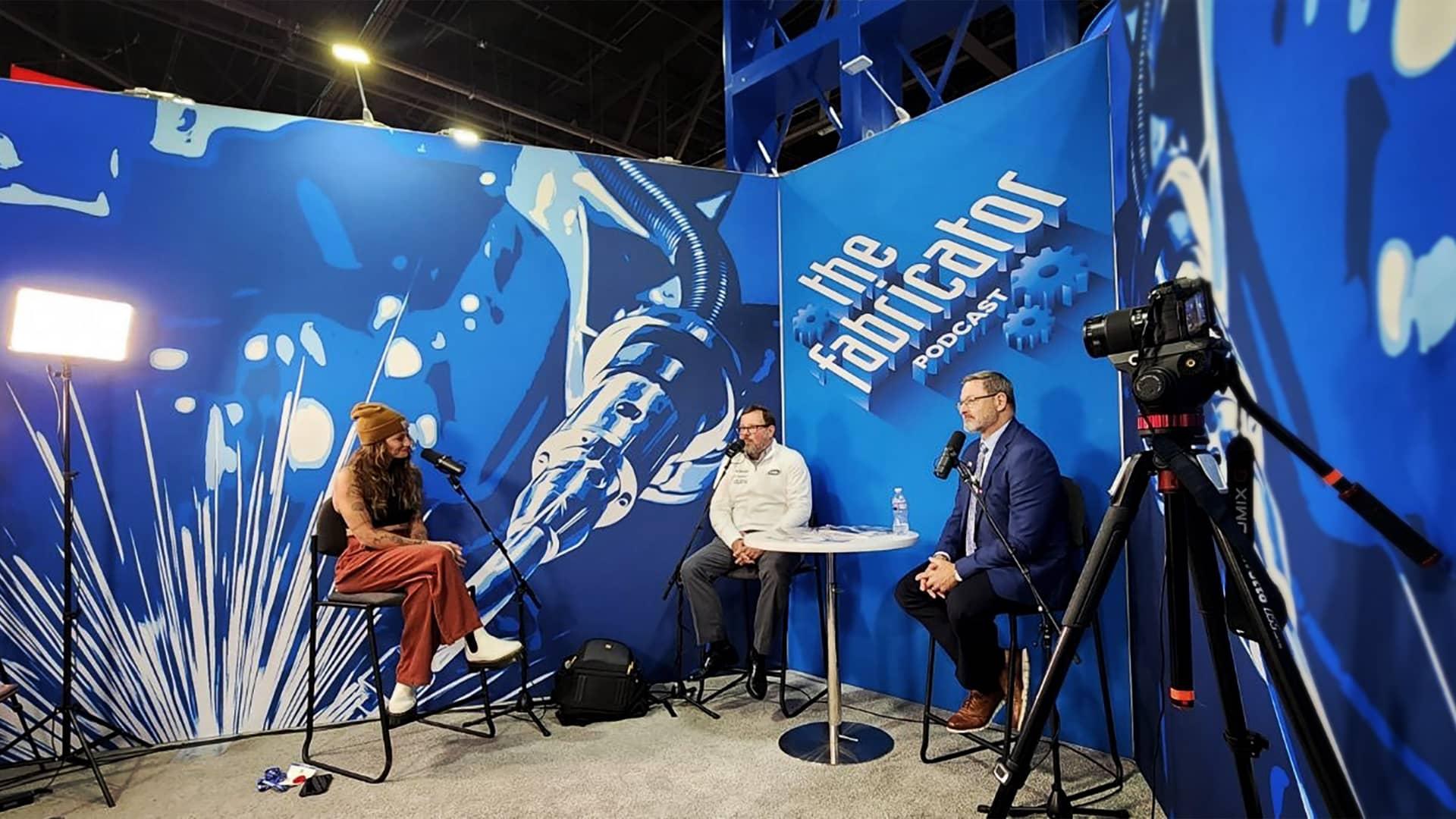
About This Podcast
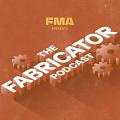
All Episodes
-
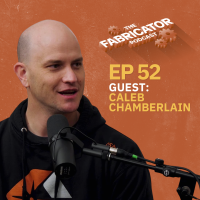 Ep. 052
Ep. 052 -
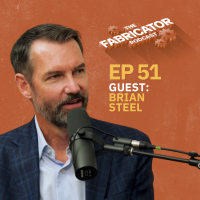 Ep. 051
Ep. 051 -
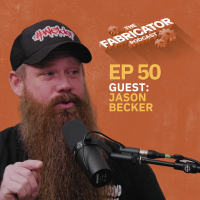 Ep. 050Welding, teaching, podcasting, and business ownership with Jason Becker
Ep. 050Welding, teaching, podcasting, and business ownership with Jason Becker -
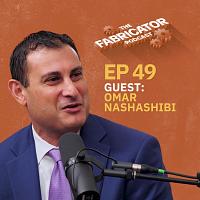 Ep. 049
Ep. 049 -
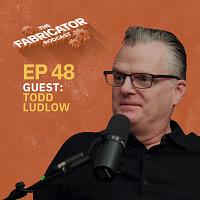 Ep. 048
Ep. 048 -
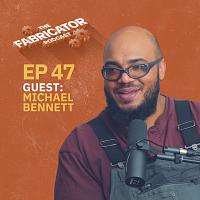 Ep. 047
Ep. 047 -
 Bonus
Bonus -
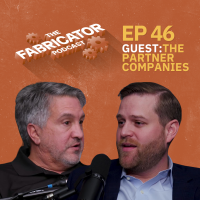 Ep. 046
Ep. 046 -
 Ep. 045
Ep. 045 -
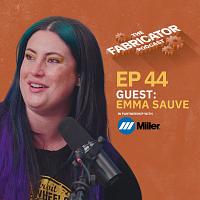 Ep. 044
Ep. 044 -
 Ep. 043
Ep. 043 -
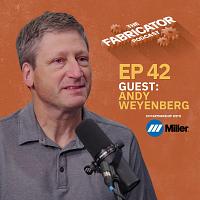 Ep. 042
Ep. 042 -
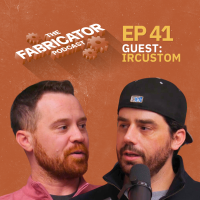 Ep. 041
Ep. 041 -
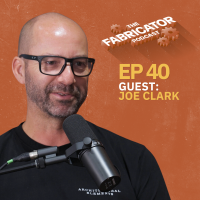 Ep. 040
Ep. 040 -
 Ep. 039
Ep. 039 -
 Ep. 038
Ep. 038 -
 Ep. 037
Ep. 037 -
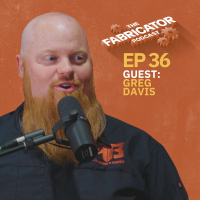 Ep. 036
Ep. 036 -
 Bonus
Bonus -
 Ep. 035
Ep. 035 -
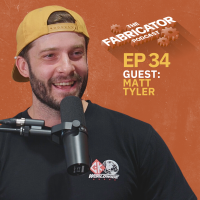 Ep. 034
Ep. 034 -
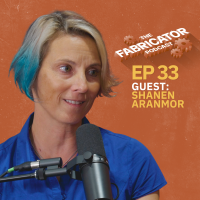 Ep. 033
Ep. 033 -
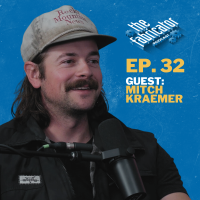 Ep. 032
Ep. 032 -
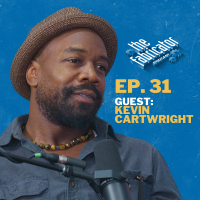 Ep. 031
Ep. 031 -
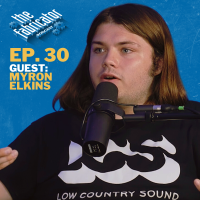 Ep. 030
Ep. 030
























